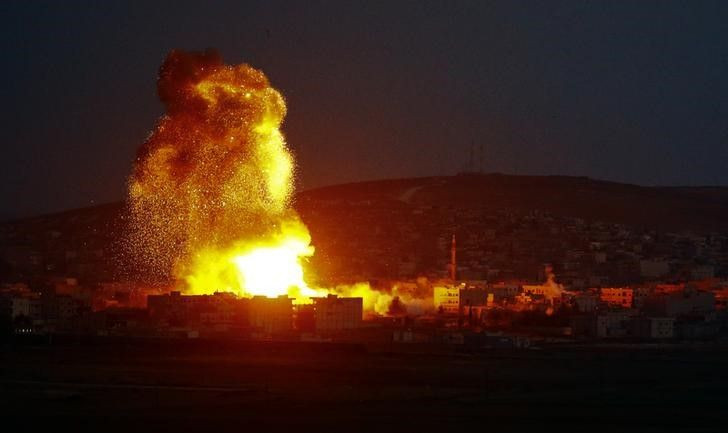Battle For Kobani Continues As ISIS Militants Shell Northern Syrian Town

Islamic State group militants began shelling the Syrian border town of Kobani Saturday, Kurdish officials told the Associated Press. The battle over the town has raged for more than a month between the militant group formerly known as ISIS and Kurdish forces. It has been the site of more than 100 airstrikes by a U.S.-led coalition.
An AP video posted on YouTube showed huge clouds of smoke rising over the town after the Islamic State group’s shelling. A senior Kurdish official in Kobani, Idriss Nassan, told AP fighting was concentrated on the “southern and eastern edges of the town.”
Kobani sits on the border between Syria and Turkey. It is currently governed by the Kurdish Democratic Union Party, or PYD, and is being defended by its military wing, the People’s Protection Units, or YPG.
This week, Turkish President Recep Tayyip Erdogan claimed 1,300 Free Syrian Army, or FSA, opposition fighters were on their way to Kobani to help defend the city, as reported by Voice of America. However, PYD officials rejected the claim.
“We have already established a connection with FSA, but no such agreement has been reached yet as Mr. Erdogan has mentioned,” PYD co-chair Saleh Moslem told Reuters. “There are already groups with links to the FSA in Kobani helping us.”
Kurds fighting in Kobani now fear Islamic State group militants may use chlorine bombs in the town. This week, doctors there reported that civilians arrived at a hospital saying they had difficulty breathing: Many had burns on their skin, teary eyes and swollen lips. Iraqi officials claimed patients displaying very similar symptoms were brought to a hospital in their country after an ISIS bombing last month.
It has been a concern that militants could obtain chemical weapons through their advances in Syria, which is known to have chemical weapons, and Iraq, which may have some left over from the days of Saddam Hussein. If the recent reports are true, however, militants are likely using chlorine because it is readily available in both countries, as AP reported. Moreover, chlorine is not banned under the Chemical Weapons Convention and can be used to purify water.
© Copyright IBTimes 2024. All rights reserved.






















